How to Treat Toxic Synovitis – Best Shoes for Kids with Hip Pain!

Has your child been limping and complaining about hip pain? Has your doctor diagnosed your child with Toxic Synovitis? Toxic Synovitis is more prevalent in boys than girls and is mostly seen in children between the ages of 3 and 8. This is a temporary condition that causes pain and inflammation in the hip. I am not a medical professional, but I have been fitting children’s shoes and orthotics for many years, so I am going to show you how to treat Toxic Synovitis and prevent hip pain by fitting children in the correct pair of shoes.
Your child might have to deal with this condition for up to 5 weeks, so it’s important to not leave this condition untreated. While this condition doesn’t cause any long-term complications, it’s important that you act fast to prevent other issues from happening.
For example, children who experience hip pain tend to change their walking gait to cope with the pain and this can lead to your children putting pressure on parts of their bodies where they are not supposed to, and this can affect their overall posture.
Children with Toxic Synovitis might have a hard time walking as they might experience pain whenever the hip is moved. Many children who have this condition refuse to walk long distances, play sports or participate in high-impact activities.
As doctors don’t know what causes toxic synovitis of the hip, it can’t be prevented or avoided, but the good news is that it can be treated by wearing the correct type of shoes and in certain cases orthotics as well.
How to Treat Toxic Synovitis: Rest – Medicine – Shoes
Most doctors recommend 2 common treatment options for Toxic Synonivitis:
- Resting the hip joint.
- Anti-inflammatory drugs such as ibuprofen or naproxyn.
I have found that the correct type of shoes and in certain cases orthotics can be extremely effective in treating and preventing toxic synovitis.
There are certain children’s shoes that come with substantial outsoles that provide shock absorption, which helps reduce the impact that your kids’ feet take when they become in contact with the ground. When children’s feet strike the ground, that shock travels through the feet to the legs, all the way up to the hips and lower back.
To help treat your child’s hip pain it’s important for your child to not put any stress or extra weight on the hip. This is why it’s so important to wear the correct type of shoes.
Parents need to understand that toxic synovitis might not be the only reason that their child is complaining about pain, as trauma is also one of the most common causes of hip pain in children.
When children are involved in sports or high-impact activities, they tend to hyperextend their legs or fall and land on their hips. They can have pulled muscles or pulled hamstrings which can attack the pelvis and present as hip pain.
To minimize the trauma, you need to make sure that your child is wearing supportive shoes at all times. Let’s take a closer look at what features your kids’ shoes must provide to help treat Toxic Synovitis.
How to Treat Toxic Synovitis – Shoes with 3 Important Features
1️⃣ Substantial Sole with Shock Absorption: This feature helps reduce the impact that your kids’ feet take when they become in contact with the ground. Certain shoes provide extra padding and targeted support to certain areas of the foot. Always look for shoes that come with a thick and supportive outsole. Below you can find an example of a shoe with a substantial sole versus a shoe with a sole that is too thin/unsupportive and doesn’t provide the correct amount of support:
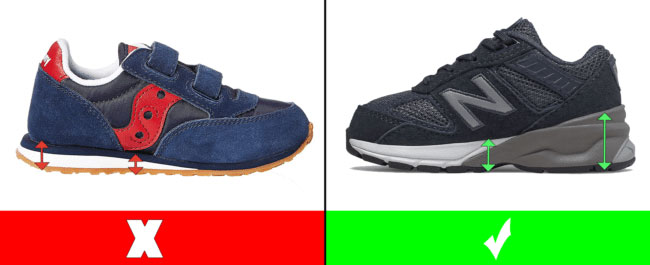
2️⃣ Firm Heel Counters: The heel counter is the part of the shoe that provides ankle support, and the firmer it is, the better. If you are not sure where the heel counter of the shoe is located, please take a look at the picture below for clarification:
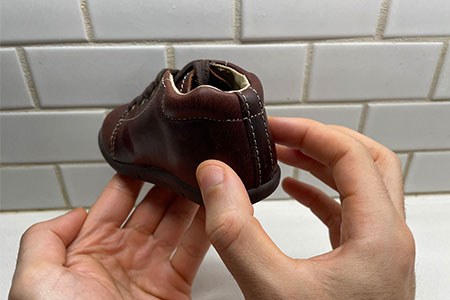
Shoes that come with a firm heel counter are going to minimize the impact that your child’s heels take every time they become in contact with the ground. Always press on the heel counter of your kids’ shoes before buying them to make sure it feels firm and not soft.
Below you can find the difference between a shoe with a soft heel counter and one with a firm heel counter:
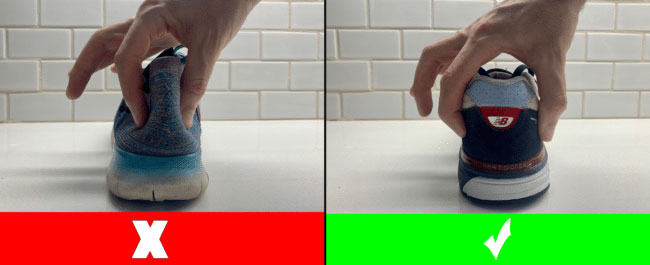
3️⃣ Shoelaces vs Velcro Closure: I always recommend shoes that come with shoelaces instead of shoes that come with Velcro closure for kids who need extra support from their shoes. The shoelaces are going to provide your child with better support and stability.
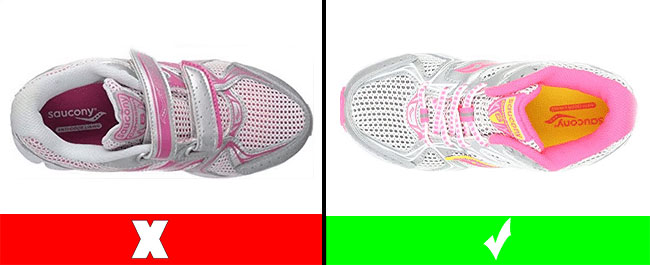
Without further ado, let’s take a look at the best shoes for kids with Toxic Synovitis.
Please note that I only review shoes that I have fitted before, as that’s the only way for me to tell the amount of support that the shoes provide, how well-made they are, and how they fit. Disclosure: Some links in this post may be affiliate links and we may receive a small commission (at no extra cost to you) when you click our links and make purchases.
The Best Shoes for Toxic Synovitis
The shoes below are available in different widths such as medium (M), wide (W), and extra wide (XW).
- The New Balance shoe style 990V6 is available for toddlers, little, and big kids
- Available in laces and velcro
- Fits children with medium, wide, or extra wide feet
- Suede/mesh upper provides durability and breathability
- Order this shoe half a size larger than your toddler’s current foot size
- The New Balance shoe style 990V6 is available for toddlers, little, and big kids
- Available in laces and velcro
- Fits children with medium, wide, or extra wide feet
- Synthetic/mesh upper provides durability and breathability
- Order this shoe half a size larger than your toddler’s current foot size
- The Stride Rite shoe style Elliot is available for toddlers
- Lace-up closure
- Fits toddlers with medium, wide, or extra wide feet
- 100% leather made
- Order this shoe half a size larger than your toddler’s current foot size
- The Stride Rite shoe style Emilia is available for toddlers
- Lace-up closure
- Fits toddlers with medium, wide, or extra wide feet
- 100% leather made
- Order this shoe a whole size larger than your toddler’s current foot size
- The Timberland shoe style Tracks is available for toddlers
- Double velcro straps
- Fits toddlers with medium or wide feet
- Water-friendly
- Order this shoe a whole size larger than your toddler’s current foot size
- The New Balance shoe style 574 is available for toddlers
- Available in velcro and laces
- Fits children with medium, wide, or extra wide feet
- Synthetic/mesh upper provides durability and breathability
- Order this shoe a whole size larger than your toddler’s current foot size
- The New Balance shoe style 990V6 is available for toddlers, little, and big kids
- Available in velcro and laces
- Fits children with medium, wide, or extra wide feet
- Synthetic/mesh upper provides durability and breathability
- Order this shoe a half size larger than your toddler’s current foot size
- The Memo shoe style Gabi is available for toddlers and little kids
- Double velcro straps
- Fits children with medium or wide feet
- Genuine leather and breathable mesh
- Thermoplastic asymmetric stiff heel counter for proper feet protection and stabilization
- Order this shoe half a size larger than your toddler’s current foot size
- The Memo shoe style Gabi is available for toddlers and little kids
- Double velcro straps
- Fits children with medium or wide feet
- Genuine leather and breathable mesh
- Thermoplastic asymmetric stiff heel counter for proper feet protection and stabilization
- Order this shoe half a size larger than your toddler’s current foot size
- The Saucony shoe style Cohesion is available for toddlers
- Velcro closure
- Fits toddlers with medium or wide feet
- Heel grid system for stable cushioning
- Compression molded EVA footbed for comfort
- Order this shoe a whole size larger than your toddler’s current foot size
- The Timberland shoe style Bootie fits toddlers and little kids
- Double velcro straps
- Fits children with medium or wide feet
- Padded collar for a comfortable fit around the ankle
- Water-friendly
- Order this shoe a whole size larger than your toddler’s current foot size
- The Memo shoe style Princessa fits toddlers and little kids
- Double velcro straps
- Fits children with medium or wide feet
- This is an ORTHOPEDIC shoe
- Rigid heel counter
- Order this shoe half a size larger than your toddler’s current foot size
- The Saucony shoe style Cohesion KDZ is available for little and big kids
- Velcro closure
- Fits children with medium and wide feet
- Heel grid system for stable cushioning
- Compression molded EVA footbed for comfort
- Order this shoe a half size larger than your child’s current foot size
- The Saucony shoe style Cohesion KDZ is available for little and big kids
- Velcro closure
- Fits children with medium and wide feet
- Synthetic and mesh upper
- Heel grid system for stable cushioning
- Order this shoe half a size larger than your child’s current foot size
- The New Balance shoe style Fresh Foam 650 is available for little and big kids
- Fits children with medium, wide, or extra wide feet
- Velcro closure
- ABZORB midsole absorbs impact through a combination of cushioning and compression resistance
- Mesh upper material features no-sew overlays for a sleek fit and feel
- Order this shoe half a size larger than your child’s current foot size
- The New Balance shoe style Fresh Foam Arishi v4 is available for little and big kids
- Fits children with medium, wide, or extra wide feet
- Velcro closure
- ABZORB midsole absorbs impact through a combination of cushioning and compression resistance
- Mesh upper material features no-sew overlays for a sleek fit and feel
- Order this shoe half a size larger than your child’s current foot size
- The New Balance shoe style 2002 is available for toddlers and little kids
- Available in laces
- Fits children with medium and wide feet
- Suede/mesh upper provides durability and breathability
- Order this shoe half a size larger than your toddler’s current foot size
- The New Balance shoe style 2002 is available for toddlers and little kids
- Available in laces
- Fits children with medium and wide feet
- Suede/mesh upper provides durability and breathability
- Order this shoe half a size larger than your toddler’s current foot size
- The New Balance shoe style Fresh Foam 650 is available for little and big kids
- Fits children with medium, wide, or extra wide feet
- Velcro closure
- Synthetic and engineered mesh upper
- Fresh Foam midsole cushioning is precision engineered to deliver an ultra-cushioned, lightweight ride
- Order this shoe a half size larger than your child’s current foot size
- The Memo shoe style Polo is available for little and big kids
- Triple velcro straps
- Fits children with medium or wide feet
- This is an orthopedic shoe
- Thermoplastic rigid heel counter
- Order this shoe a half size larger than your child’s current foot size
- The Memo shoe style Chicago is available for little and big kids
- Triple velcro straps
- Fits children with medium or wide feet
- This is an orthopedic shoe
- Thermoplastic rigid heel counter
- Order this shoe a half size larger than your child’s current foot size
- The New Balance shoe style Coco is available for little and big kids
- Lace-up closure
- Fits children with medium or wide feet
- NDurance rubber outsole technology provides superior durability in high-wear areas to help get more out of the shoes
- Order this shoe a half size larger than your child’s current foot size
- The Adidas shoe style Own the Game 2.0 is available for little and big kids
- Lace-up closure
- Fits children with medium or wide feet
- Supportive outsoles and firm heel counter
- Order this shoe a half size larger than your child’s current foot size
- The Adidas shoe style Cross Em Up Select is available for little kids
- Lace-up closure
- Fits children with medium or wide feet
- Non-marking outsole
- Order this shoe a whole larger than your child’s current foot size
- The Saucony shoe style Kinvara LTT is available for little and big kids
- Lace-up closure
- Fits children with medium or wide feet
- Cushioned footbed
- Order this shoe a whole size larger than your child’s current foot size
- The Saucony shoe style Shadow 6000 is available for little and big kids
- Lace-up closure
- Fits children with medium or wide feet
- Cushioned footbed
- Order this shoe half a size larger than your child’s current foot size
- The New Balance shoe style 574 is available for little and big kids
- Lace-up closure
- Fits children with medium or wide feet
- ENCAP midsole cushioning provides good arch and heel support
- Order this shoe half a size larger than your child’s current foot size
- The New Balance shoe style 327 is available for little and big kids
- Lace-up closure
- Fits children with medium or wide feet
- Suede and mesh upper
- Order this shoe a whole size larger than your child’s current foot size
- The New Balance shoe style Fresh Foam X 1080v13 is available for big kids
- Lace-up closure
- Fits children with medium or wide feet
- Suede and mesh upper
- Order this shoe half a size larger than your child’s current foot size
- The New Balance shoe style Fresh Foam X 1080v13 is available for big kids
- Lace-up closure
- Fits children with medium or wide feet
- Suede and mesh upper
- Order this shoe half a size larger than your child’s current foot size
Are Any Other Shoe Choices Available?
If your child has narrow feet please do not hesitate to contact me directly and I will recommend specific shoe styles that are capable of accommodating a narrow foot: [email protected]
How to Retrieve Your Child’s Exact Foot Length and Shape
If you want to be 100% sure about what shoe size to order online, I suggest that you follow the instructions in a different resource I created.
The fact is that hip pain may be caused by many things, including overuse, a fall, or a twisting movement. Other causes include a viral infection or a problem with the bones in the hip.

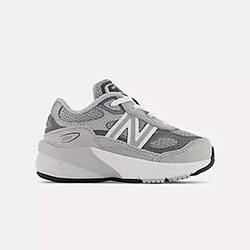

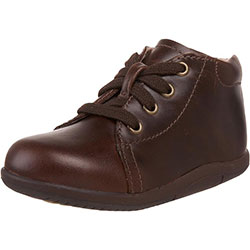
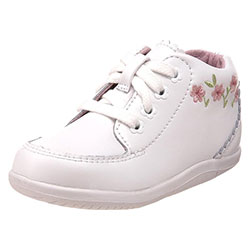
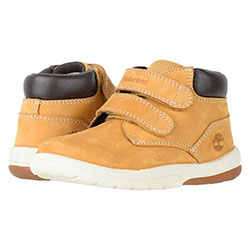
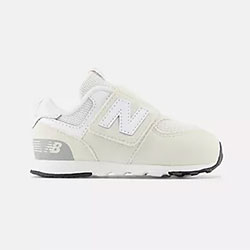
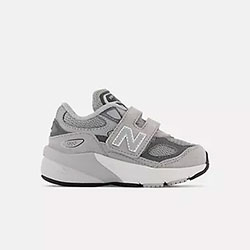
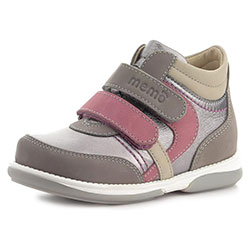
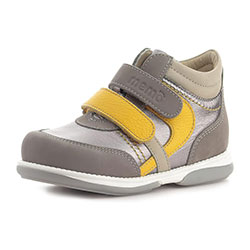
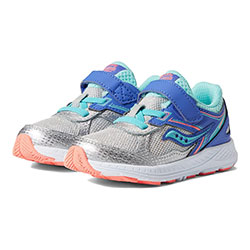
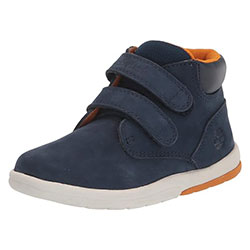
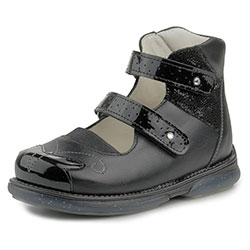




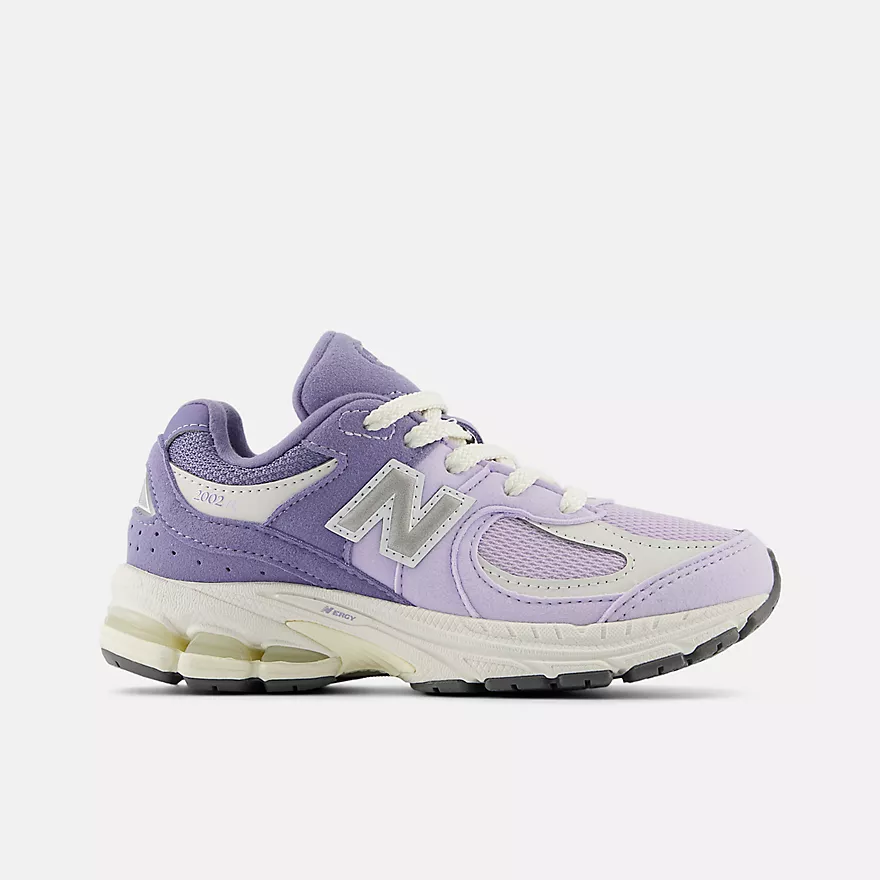
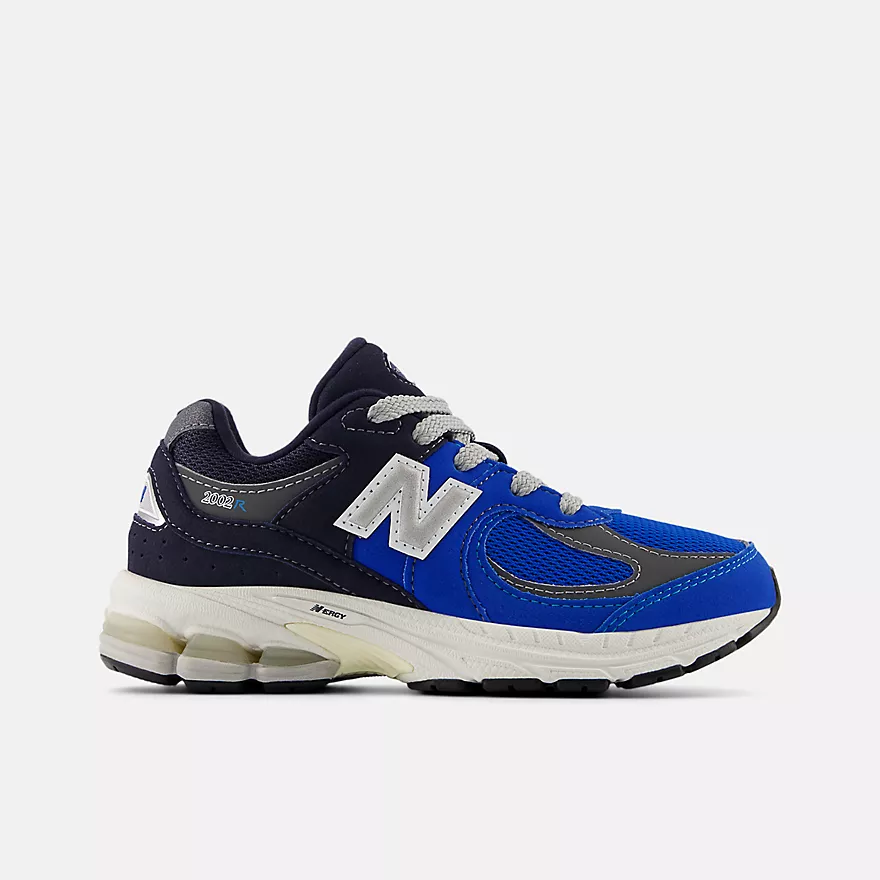

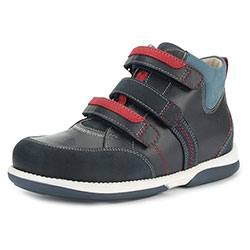
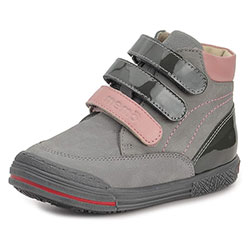
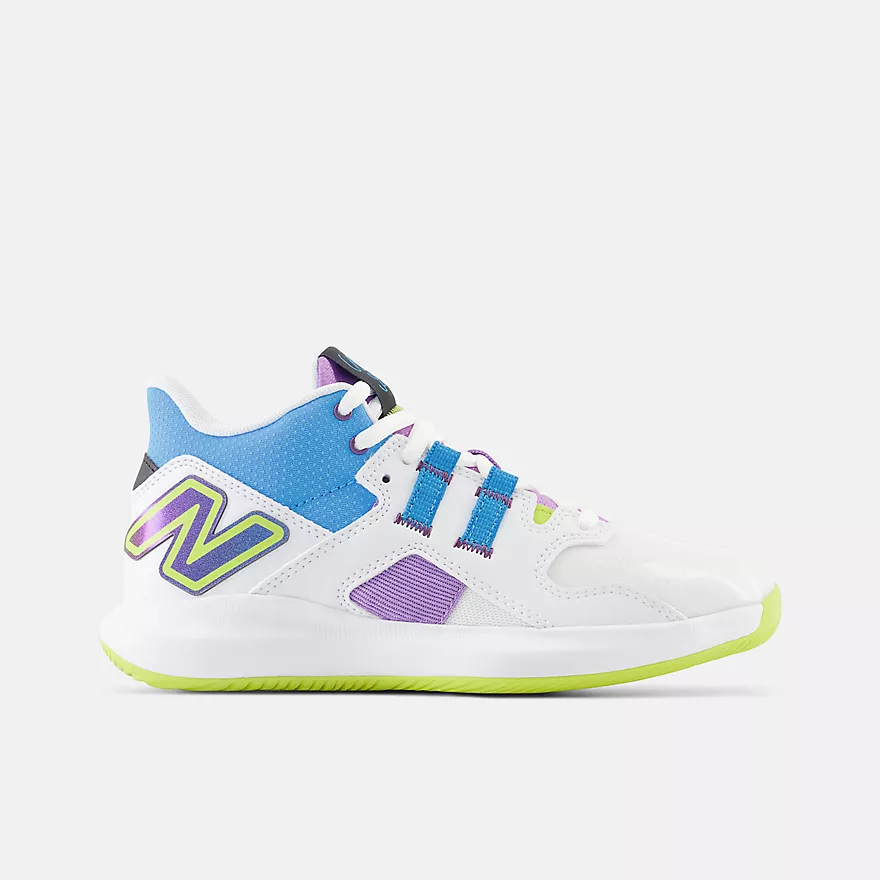
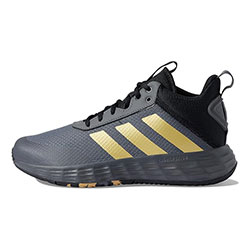
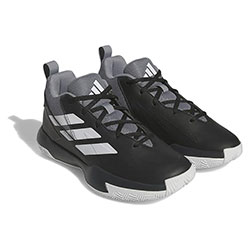



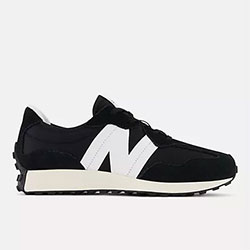


Great article. If I’d known better, I would have worn better shoes earlier on. I suffer from hip pain – to the point where I need a hip replacement. People underestimate the importance of good shoes!
Hi Robin –
I always recommend parents to be proactive when it comes to treating their kids’ foot conditions. Taking care of a child’s foot from an early stage can prevent future foot, leg, back, and hip problems.